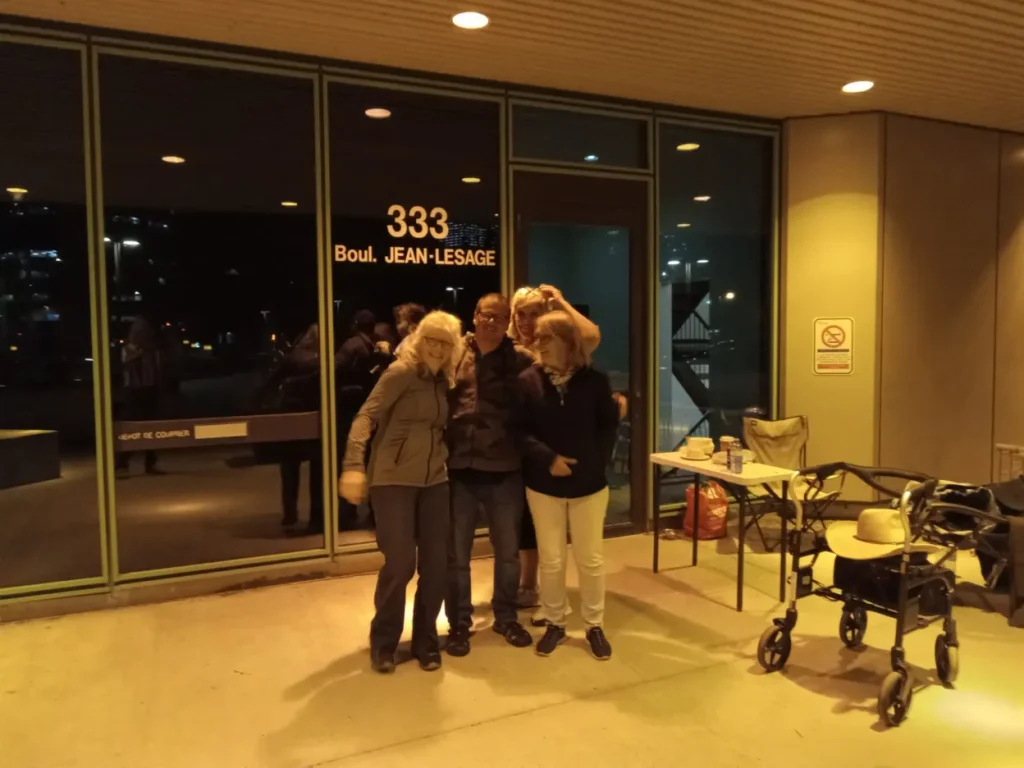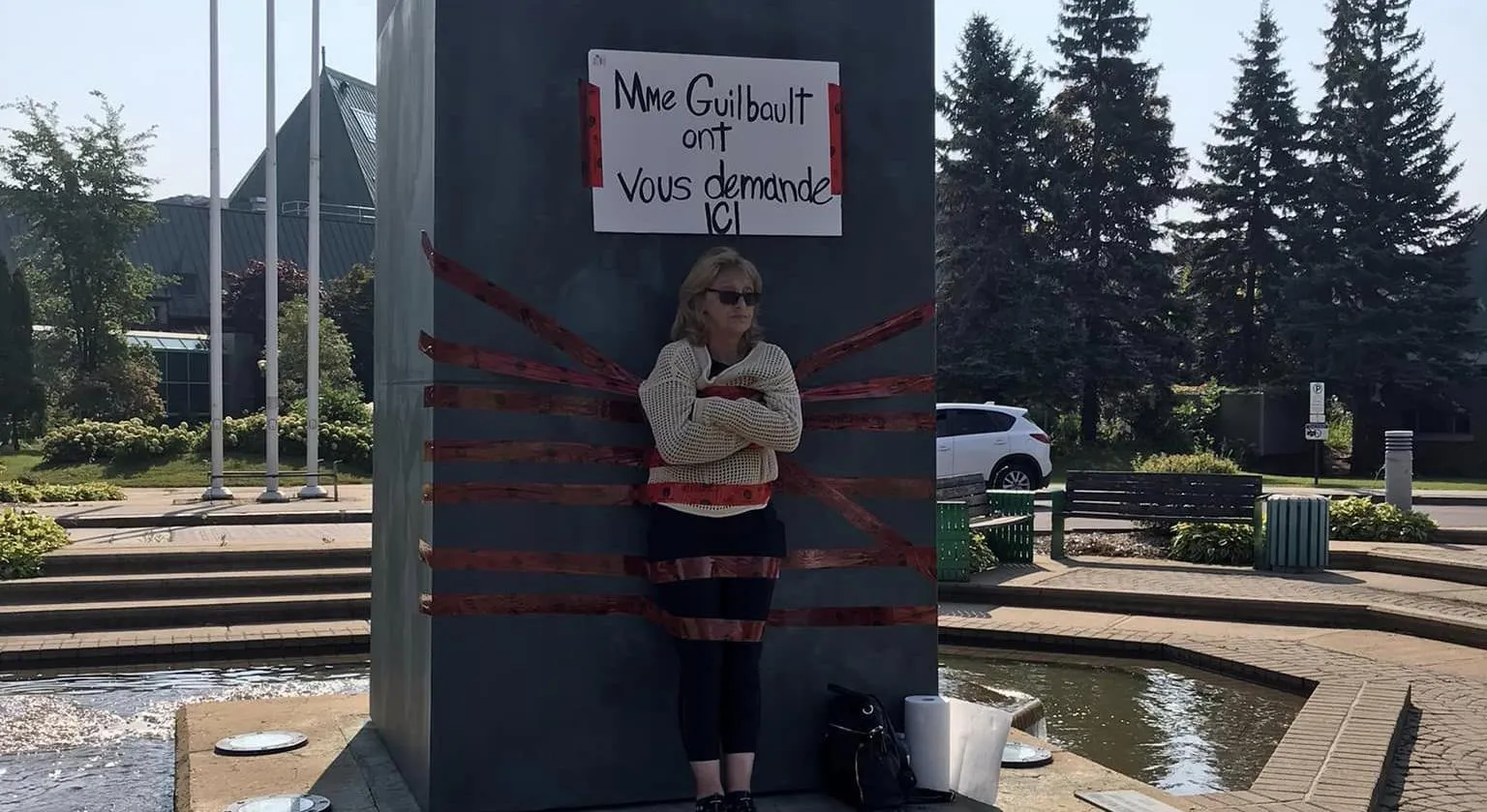For over two weeks, members of the A.A.R.V.S. (in english, Association of Injured Drivers Victims of the SAAQ) demonstrated in front of the head office of the Société de l'assurance automobile du Québec (SAAQ), Quebec's public auto insurer. They have now left, but their fight is not over. Christiane Vallière, president of AARVS, reportedly met with a Quebec MP to press their claims yesterday.
Among other things, she denounces the public insurance company for the misery into which elderly accident victims are plunged.
Christiane herself had a serious accident in 2008, when she suffered a severe cervical sprain, resulting in muscular dystrophy. Her arm remained partially paralyzed, a situation that could have been avoided if the SAAQ had recognized her injuries earlier.
“I had to live for five years on my husband's old-age pension alone,” says Christiane. “When they finally recognized my injuries, it was too late. I could no longer be operated on. They made me an invalid.”
Her health continued to deteriorate, with six heart attacks on top of her disability. This long struggle to assert her rights led her to create the AARVS, in the hope of giving a voice to those ignored by the SAAQ, like herself.
Broken promises
For years, Christiane has been fighting to improve conditions for elderly accident victims. Before the latest reform, benefits for accident victims over 65 fell by 25% each year, until they disappeared altogether at age 68. These people had to make do with the meagre minimum Canadian pension of $1,359.
In 2021, Christiane went on hunger strike to try to get the SAAQ's top brass to move. The response was positive: she was promised changes.
During a meeting filmed by Christiane and obtained by The North Star, Alain Généreux, the political attaché to François Bonnardel, Quebec's Minister of Transport at the time, even stated that Bill 22, adopted in 2022, would allow accident victims to receive their income replacement until their death.
But the reality is very different.
Let's take the example of a person injured at age 42, who was earning $50,000 a year before the accident. Under the new SAAQ rules, she would receive about $45,000 a year until age 65 to replace her income. At age 67, this amount drops by 75%, to just $11250 a year.
At age 68, a complex formula is applied. In our example, the accident victim would receive only $244 per month. Adding this amount to the Old Age Security and Guaranteed Income Supplement benefits, the total comes to $1,603.
This amount is largely insufficient considering the current cost of living, and is $315 below the poverty line of around $23,000, according to Centraide Montreal. It should be noted that this threshold is regularly criticized as being too low.
The Quebec Pension Plan (QPP) retirement pension could offer some support to this person, if he or she has contributed enough according to QPP criteria. However, it is unlikely that this will enable her to exceed $27,000 per year, more than $6,000 below the minimum threshold for living with dignity, according to the Institut de recherche et d'informations socio-économiques (IRIS).

Crumbs for domestic assistance
In addition to reduced benefits, access to domestic assistance is another major problem for Christiane. She has great difficulty cooking and cleaning because of her injuries. “My husband is also a road accident victim. Now he's sick too. I asked for personal assistance and no, they just give me $67 a week.”
“I told the SAAQ: 'Find me someone who will accept $67 a week, and I'll take it right away.'” Instead, it's Christiane's friends who have to come and help her so she can function on a daily basis.
“I buy them lunches at restaurants, meals. I buy them little treats, because I don't want to lose my friends anyway.” However, the SAAQ has asked her to make an official declaration confirming that she pays a salary for domestic assistance.
“No, they don't receive the money!” exclaims Christiane. “I can't do that.” So she wrote a formal letter to the government corporation, complaining that she was being asked to make false statements. It was only after these threats that they agreed to guarantee her the $67 a week.
According to the government, the new law should have improved domestic assistance for everyone. But it was mainly the so-called “catastrophically injured” who ended up benefiting from these improvements. Christiane explains, however, that these injuries are few: among the examples considered by the SAAQ are multiple amputees, as well as severe burn victims.
Although François Bonnardel promised to correct a “historic error” by ensuring better support for accident victims, the changes in Bill 22 follow the same logic as SAAQ CEO Nathalie Tremblay's reform in the early 2000s. This reform aimed to align the SAAQ with the private insurance model, based on the notion of “risk”, in order to reduce costs as much as possible.
At a demonstration last year, the political attaché to Quebec Deputy Premier Geneviève Guilbault promised a meeting with the AARVS, which is still pending. “We're tired of waiting,” says Christiane. “They've ignored us for a year, but we won't give up.”
- “It’s time to act, before everyone ends up dead”
- Quebec’s public auto insurer creates bureaucratic hell for road accident victims
- When surveillance becomes a weapon against road accident victims
- Road accident victims left to fend for themselves over the age of 67
- The SAAQ operates like private insurance, and the human cost is enormous
- Letter: The promise to road accident victims has been betrayed
- Letter – “Enough is enough, SAAQ, hear my cry”


